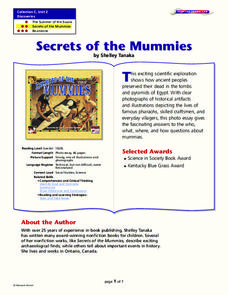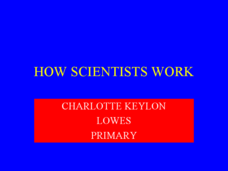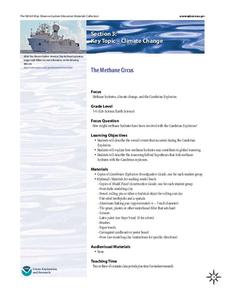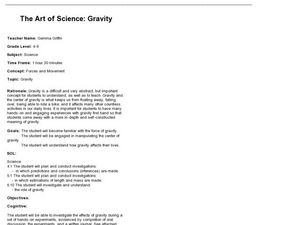Chicago Botanic Garden
Recognizing Change (Observation vs. Inference)
What is the difference between making inferences and making observations? Young climatologists refer to a PowerPoint to make observations on each slide. They record their observations in a provided worksheet before drawing a...
American Physiological Society
Did I Observe it or Infer it?
Take the mystery out of inquiry! When young scientists learn to use their keen powers of observation to make smart inferences about a situation, they are well on their way to understanding what the scientific method is all...
Towson University
Mystery Tubes
How do scientists know they're right? Truth be told, they don't always know. Explore the scientific process using mystery tubes in an insightful activity. Young scientists discover how to approach and solve problems in science, how ideas...
National History Day
Helping Life and Aiding Death: Science, Technology, and Engineering at Work during World War I
Science, engineering, and United States history? Pupils research collections of artifacts from the Smithsonian to learn about historical scientific innovations. At the end of the lesson, they write an essay to discuss technology's...
NOAA
Animals of the Fire Ice
When the sun's rays can't reach the producers in a food web, where does all the energy come from? Extreme environments call for extreme food sources. Young scientists investigate creatures that appear to get their energy from methane...
NOAA
Journey to the Unknown
What's it like to be a deep-sea explorer? Tap into the imaginations of your fifth and sixth graders with a vivid lesson, the second part of a six-part adventure. Learners close their eyes and submerge themselves in an expedition aboard...
Curated OER
Secrets of the Mummies
How did the ancient people of Egypt preserve their dead so well that their bodies are still recognizable today? Learn the painstakingly complex process they used for preservation. Young scholars read and summarize a narrative detailing...
University of Colorado
The Moons of Jupiter
Middle schoolers analyze given data on density and diameter of objects in space by graphing the data and then discussing their findings. This ninth installment of a 22-part series emphasizes the Galilean moons as compared to other...
Science 4 Inquiry
The Ups and Downs of Populations
Life has its ups and downs ... especially if you're an animal! Biology scholars engage in a population study through an inquiry-based lesson. Pupils work together to explore the factors that affect deer populations, then examine the...
Curated OER
How Scientists Work
The arsenal of tools a scientist uses to observe the world are varied. This great presentation gives young scholars a look at some of the strategies they should use when looking at the world around them. The information can be used as a...
Curated OER
Frost Depth Study
Students complete activities to study the frost and frost depth. In this frost study lesson plan, students use frost tubes to study and measure the frost at their school. Students measure the frost in the tube and enter their data online...
Curated OER
Science in baseball
Sixth graders examine how science is used in everyday activities, such as baseball.
Curated OER
Ornithology and Real World Science
Double click that mouse because you just found an amazing lesson! This cross-curricular Ornithology lesson incorporates literature, writing, reading informational text, data collection, scientific inquiry, Internet research, art, and...
NOAA
The Methane Circus
Step right up! An engaging research-centered lesson, the third in a series of six, has young archaeologists study the amazing animals of the Cambrian explosion. Working in groups, they profile a breathtaking and odd creature and learn...
Curated OER
Making Regolith
You may not be able to take a field trip to the moon, but that doesn't mean your class can't study moon rocks. Using graham crackers as the moon's bedrock and powdered donuts as micrometeorites, young scientists simulate...
Curated OER
Observations and Inferences
Learners observe how to distinguish observations form inferences. In this examining inferences instructional activity students list observations relating to the activity and discuss the importance of them.
Ocean Explorer
Looking for Clues
Upper graders become "shipwreck detectives" by studying the debris field from a shipwreck in the Aegean Sea which took place in the 700s. A website is accessed that gives specific information about the debris field, and pairs of...
Curated OER
Inference By Analogy
Students infer the use or meaning of items recovered from a North Carolina Native American site based on 17th-century European settlers' accounts and illustration.
Workforce Solutions
On the Job
Four lessons spotlight a variety of professions while boosting listening and observational skills and making inferences. Lesson one challenges pupils to group cards based on a commonality then justify the relationship they see....
Curated OER
Medical Explorer
After reading a case study, pupils will explore possible diagnoses, assessment, and treatment plans. Finding the definitions to medical vocabulary and sorting through patient history, they will begin to understand the process of...
NASA
Let's Investigate Mars
Take your science class on a hypothetical field trip to Mars with an engaging astronomy lesson. After first learning about NASA's Mars rover missions, young scientists plan their own scientific investigations of Earth's...
Curated OER
The Art of Science: Gravity
Through a series of experiments and demonstrations, fifth graders will learn about gravity. They will make predictions, drop various objects, write down their observations, and try to understand gravity through balance. This lesson seems...
Curated OER
Keep Away
Study biological diversity by analyzing given data, and make inferences about the possible effects of oil drilling operations on specific benthic communities. This lesson plan allows students to use their statistical analysis skills...
Curated OER
3-2-1 Pop!
Students investigate how rocket liftoff demonstrates Newton's Laws of Motion. They participate in a class discussion, and construct a rocket powered by the pressure generated from an antacid tablet reacting with water.

























